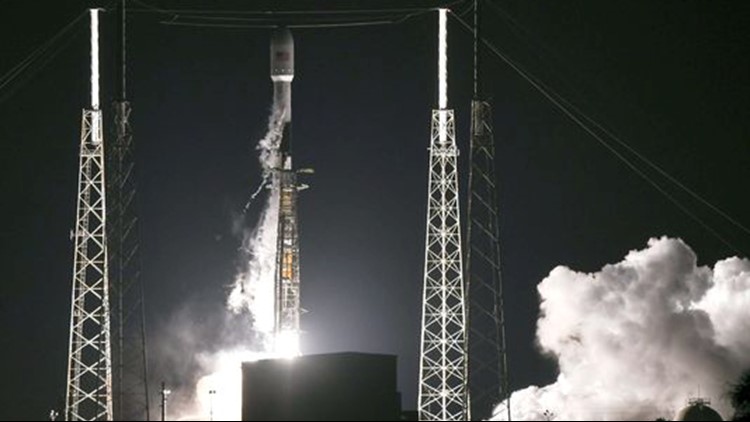Is a SpaceX rocket ready for a three-peat?
The Falcon 9 booster that blasted off from Cape Canaveral early Tuesday, Aug. 7, and landed on a ship minutes later, could become the company’s first to launch a third orbital mission — possibly before the end of this year.
Until now, SpaceX has retired rockets after two launches. But Tuesday’s launch of an Indonesian communications satellite was the first to re-fly an upgraded Falcon 9, known as Block 5, that is designed to launch 10 or more times.
So far, the booster appears up to the task.
The 230-foot Falcon 9 lifted off for the first time back on May 11, lifting Bangladesh’s first communications satellite to orbit from Kennedy Space Center.
Less than three months later, at 1:18 a.m. Tuesday, the same first-stage booster fired nine Merlin engines to roar into darkness from Cape Canaveral Air Force Station’s Launch Complex 40 with 1.7 million pounds of thrust.
Eight minutes into the flight, the booster swooped down from space to its second tail-first landing on legs on the deck of SpaceX’s modified barge, the “Of Course I Still Love You,” stationed 400 miles down range in the Atlantic Ocean.
The upper-stage continued into orbit, firing an engine twice before releasing the roughly 12,800-pound “Merah Putih” satellite 32 minutes after liftoff.
The launch was SpaceX’s 15th of the year, just three shy of last year’s total, and the 60th overall by a Falcon 9 rocket since its debut in 2010.
With the introduction of the upgraded Falcon 9 and its successful re-flight, SpaceX begins in earnest its drive to transition reusable rockets from an experimental project into something more routine, like aircraft operations.
If successful, that innovation over time promises to lower the cost of launches that SpaceX now advertises online for $62 million. CEO Elon Musk ultimately hopes to make it economical for an even bigger rocket — the Big Falcon Rocket, or BFR — to transport human settlers to Mars.
Another company, Blue Origin, backed by Amazon CEO Jeff Bezos, has launched and landed its smaller, suborbital New Shepard booster up to five times. The company also plans to reuse larger New Glenn rockets to be built in a new factory at KSC's Exploration Park, possibly launching by 2020.
SpaceX's latest Falcon 9 booster should return to Port Canaveral within three or four days, and will then undergo inspections to determine its fitness for a third launch.
Tuesday’s launch delivered a much-needed satellite to orbit for PT Telkom Indonesia, that country’s largest telecommunications and network provider.
Formerly designated Telkom-4, the satellite renamed Merah Putih — representing the Indonesian flag’s red and white colors — will replace the Telkom-1 spacecraft launched in 1999. After 18 years of service, beyond it design life, Telkom-1 suffered a fuel leak a year ago and began to break apart in orbit, disrupting services.
Flying 22,300 miles over the equator, in an orbital slot at 108 degrees East longitude, the new satellite, built by California-based SSL, will improve phone and internet service to the more than 17,000 islands of the Indonesian archipelago, as well as India and other parts of South Asia and Southeast Asia.
“Satellite plays a vital role in our telecommunications infrastructure,” said Zulhelfi Abidin, Telkom's chief technology officer.
SpaceX is aiming for another commercial satellite launch from the Cape later this month — potentially its fourth launch in as many weeks.
For now, the Eastern Range will prepare for a second launch in just over four days. A United Launch Alliance Delta IV Heavy rocket is readying to launch NASA’s $1.5 billion Parker Solar Probe mission to study the sun, targeting a 3:48 a.m. Saturday, Aug. 11, liftoff from Launch Complex 37.
Contact Dean at 321-917-4534 or jdean@floridatoday.com. And follow on Twitter at @flatoday_jdean and on Facebook at https://www.facebook.com/SpaceTeamGo.



